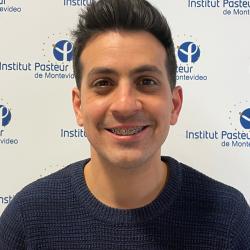
Scalese Barreto, Gonzalo
Researcher graduateResearch interests
1. Polyoxovanadates: Potential Antiparasitic and Antiviral CompoundsThis research line aims to develop new polyoxovanadates, evaluate their potential as anti-infective agents, conduct chemical speciation studies to identify the species responsible for biological activity, and investigate potential targets and proposed modes of action. Since April 2023, the CSIC I+D 2023 project titled “Exploring a Series of Polyoxovanadates as Potential Antiparasitic Compounds Active Against Trypanosoma cruzi” (led by Prof. Dinorah Gambino) has been underway. Within this framework, the graduate student Rodrigo Moreira is conducting his postgraduate thesis in Chemistry.
2. Development of Vanadium Compounds Affecting the Redox Metabolism of Trypanosomatid Parasites
This research line seeks to expand the study of potential targets of newly developed vanadium compounds by examining their effects on the redox metabolism of low-molecular-weight thiols, particularly as potential inhibitors of Trypanothione Synthase (TryS). This line is supported by the ANII-Clemente Estable Modality II project (2025–2027): “Expanding the Series of N5-Substituted Paullones as Inhibitors of Trypanothione Biosynthesis: An Inorganic Chemistry Approach.” Through these projects, the aim is not only to identify metallocompounds that disrupt thiol homeostasis in parasites but also to develop new target-directed compounds. Specifically, paullones will be used as a base structure for TryS inhibitors, with chemical modifications through coordination compound formation to enhance enzymatic inhibition.
3. Antiparasitic Ruthenium Compounds
Building on recent advances where our group reported highly promising ruthenium coordination compounds, the non-funded project “Expanding the Series of Antiparasitic Ruthenium Compounds: Chemical, Physicochemical, and Biological Studies” is being pursued. This project includes chemical modifications aimed at increasing biological activity or reducing specific cytotoxicity.
4. Postdoctoral Project: Ergosterol in Trypanosomes – Detection, Protective Role in Lipid Peroxidation of Cellular Membranes, and Its Connection to Glutaredoxins
Since March 2023, a postdoctoral training stay has been underway at the Trypanosome Redox Biology Laboratory of the Institut Pasteur de Montevideo under the supervision of Dr. Marcelo Comini. This research involves developing molecular tools for screening and detecting ergosterol levels as a target for rationally designed metallic compounds with antiparasitic activity. Furthermore, it aims to study the role of ergosterol in protecting against lipid peroxidation and in the thermotolerance phenomenon linked to redox mechanisms regulated by Grx in pathogenic trypanosomatids. The results will serve as inputs for designing new metal-based compounds targeting attractive molecular targets in trypanosomatid parasites.
Working area
Diseases caused by trypanosomatid parasites, such as American trypanosomiasis (Chagas disease), African trypanosomiasis (sleeping sickness), and leishmaniasis, represent a significant health problem in endemic regions and an emerging threat in industrialized countries due to global migration. Current chemotherapy for treating these diseases is inadequate, and no vaccines are available. Furthermore, the pharmaceutical industry has invested very little in developing new drugs, underscoring the importance of academic research in developing novel therapies for these diseases.Medicinal Inorganic Chemistry focuses on the rational design of new compounds with pharmacological activity, and many bioactive metal-based compounds are currently in clinical use or preclinical development. The research group I belong to, led by Prof. Dinorah Gambino, has extensive experience in developing inorganic compounds with pharmacological potential against trypanosomatid parasites.
My contribution has centered on the design, development, biological evaluation, and mechanism of action studies of new metal-based compounds, specifically vanadium compounds, with potential antiparasitic activity. During my research, I specialized in the Medicinal Inorganic Chemistry of vanadium, exploring the potential of these compounds against the trypanosomatid parasites Trypanosoma cruzi and Leishmania infantum.
Additionally, my postdoctoral project at the Trypanosome Redox Biology Laboratory of the Institut Pasteur represents a logical continuation of my work, allowing me to further expand my contributions to parasitic disease research. This includes the development of new tools for studying the mode of action of drug candidates and a deeper understanding of the biology of these organisms, providing valuable insights for the rational design of active compounds.
Personal information
Email: gscalese@fq.edu.uyORCID: https://orcid.org/0000-0002-5386-6225
SCOPUS: https://www.scopus.com/authid/detail.uri?authorId=56574271500
CVUy: see
Institution: Facultad de Química - Udelar
Other Institution: Institut Pasteur de Montevideo
Career at PEDECIBA
Chemistry Area
As researcher
| Motive | Start date | Minutes | |
|---|---|---|---|
| Investigador - Ingreso | Grado 3 | 12/07/2023 | View minutes |
As student
| Motive | Education level | Start date | Minutes |
|---|---|---|---|
| Estudiante - Egreso | Doctorado | 19/04/2023 | View minutes |
| Estudiante - Define | Doctorado | 13/03/2019 | View minutes |
| Estudiante - Ingreso | Posgrado | 10/05/2017 | View minutes |